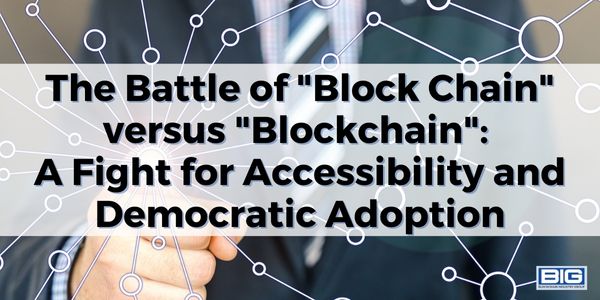
Block Chain is for the People | Blockchain is for the Elite
In the realm of technological innovation, a contentious battle rages on, dividing the masses and the elite. At the heart of this dispute lies the spelling of a revolutionary technology—block chain. The debate over whether it should be spelled as two separate words or as a single entity, blockchain, symbolizes a larger struggle for accessibility and democratic adoption.
This article delves into the clash between these linguistic factions and advocates for block chain’s rightful place as a tool for the people’s empowerment.
A Linguistic Divide: The Battle Begins
From online forums to academic debates, the spelling of block chain has become a battlefield. The traditional spelling, block chain, embodies simplicity and accessibility. It represents the everyday individuals who seek to participate in the technological revolution without feeling alienated or overwhelmed. Conversely, the term blockchain, with its consolidated form, carries an air of exclusivity, favored by the elite class who believe in preserving the status quo.
Democratizing Technology: The Power of Block Chain for the People
Block chain, written as two words, embodies the spirit of democratizing technology. It champions the cause of accessibility, ensuring that the benefits of this revolutionary innovation reach the masses. By embracing block chain, individuals can participate in decision-making processes, gain control over their digital identities, and reclaim power from centralized authorities.
For instance, block chain technology can revolutionize the financial sector, allowing individuals to conduct secure and transparent transactions without intermediaries. Decentralized applications built on block chain enable the development of user-centric platforms that empower content creators and provide fair compensation for their work. By spelling it as block chain, we highlight the need to make technology more accessible, placing power back into the hands of the people.
The Elite’s Embrace: The Rise of Blockchain’s Exclusivity
In contrast to the people’s spelling, the rise of blockchain as the preferred term reflects the interests of the elite. Large corporations, financial institutions, and technocratic powerhouses gravitate toward this spelling, emphasizing their pursuit of scalability, security, and control over the technology. Blockchain’s consolidation into a single word represents an attempt to monopolize and exclude those who do not conform to the established power structures.
Blockchain’s adoption by the elite is evident in its implementation in various sectors. It finds favor in supply chain management, where it ensures traceability and authenticity of products. The financial industry utilizes blockchain to streamline transactions and establish trust among parties. However, this embrace of blockchain comes at the cost of leaving the masses behind, perpetuating social and economic disparities.
Fighting for Universal Adoption: The People’s Revolution
The battle for universal adoption of block chain technology demands unity and resistance against elitism. The people must reject the imposition of an exclusive narrative that perpetuates inequality and concentrates power in the hands of a few. By reclaiming block chain, the masses can assert their right to participate in the technological revolution and shape its trajectory.
Education and awareness play a vital role in empowering individuals to demand the adoption of block chain as the accessible spelling. Governments, organizations, and communities must collaborate to develop user-friendly applications, intuitive interfaces, and educational campaigns that ensure technology is inclusive and equitable for all. By highlighting the benefits of block chain technology for the people, we can pave the way for a future where everyone has an equal opportunity to participate and benefit from its transformative potential.
The battle between “block chain” and “blockchain” extends far beyond linguistic preferences. It signifies a struggle for inclusivity, democratic adoption, and the eradication of social disparities. By championing block chain, the people demand access to a technology that empowers and benefits everyone, not just the privileged few. It is crucial to recognize that technology should serve as a tool for progress and equality, not a means to further divide society.
The fight for universal adoption of block chain in its original form represents a movement toward a more inclusive and accessible future. It is a call to dismantle barriers and create a level playing field where individuals from all walks of life can participate, innovate, and reap the rewards of technological advancements. By spelling it as block chain, we reclaim the technology for the people and ensure that its benefits are shared by all.
Note: In this blog, we opted for the term “Block Chain” instead of “Blockchain” to cater to newcomers in the blockchain space, ensuring the content is more accessible for those readers.



